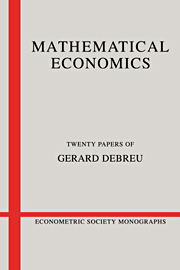Book contents
- Frontmatter
- Introduction
- 1 The coefficient of resource utilization
- 2 A social equilibrium existence theorem
- 3 A classical tax-subsidy problem
- 4 Existence of an equilibrium for a competitive economy
- 5 Valuation equilibrium and Pareto optimum
- 6 Representation of a preference ordering by a numerical function
- 7 Market equilibrium
- 8 Economics under uncertainty
- 9 Topological methods in cardinal utility theory
- 10 New concepts and techniques for equilibrium analysis
- 11 A limit theorem on the core of an economy
- 12 Continuity properties of Paretian utility
- 13 Neighboring economic agents
- 14 Economies with a finite set of equilibria
- 15 Smooth preferences
- 16 Excess demand functions
- 17 The rate of convergence of the core of an economy
- 18 Four aspects of the mathematical theory of economic equilibrium
- 19 The application to economics of differential topology and global analysis
- 20 Least concave utility functions
14 - Economies with a finite set of equilibria
Published online by Cambridge University Press: 05 January 2013
- Frontmatter
- Introduction
- 1 The coefficient of resource utilization
- 2 A social equilibrium existence theorem
- 3 A classical tax-subsidy problem
- 4 Existence of an equilibrium for a competitive economy
- 5 Valuation equilibrium and Pareto optimum
- 6 Representation of a preference ordering by a numerical function
- 7 Market equilibrium
- 8 Economics under uncertainty
- 9 Topological methods in cardinal utility theory
- 10 New concepts and techniques for equilibrium analysis
- 11 A limit theorem on the core of an economy
- 12 Continuity properties of Paretian utility
- 13 Neighboring economic agents
- 14 Economies with a finite set of equilibria
- 15 Smooth preferences
- 16 Excess demand functions
- 17 The rate of convergence of the core of an economy
- 18 Four aspects of the mathematical theory of economic equilibrium
- 19 The application to economics of differential topology and global analysis
- 20 Least concave utility functions
Summary
A mathematical model which attempts to explain economic equilibrium must have a nonempty set of solutions. One would also wish the solution to be unique. This uniqueness property, however, has been obtained only under strong assumptions, and, as we will emphasize below, economies with multiple equilibria must be allowed for. Such economies still seem to provide a satisfactory explanation of equilibrium as well as a satisfactory foundation for the study of stability provided that all the equilibria of the economy are locally unique. But if the set of equilibria is compact (a common situation), local uniqueness is equivalent to finiteness. One is thus led to investigate conditions under which an economy has a finite set of equilibria.
Now nonpathological examples of economies with infinitely many equilibria can easily be constructed in the case of pure exchange of two commodities between two consumers. Therefore one can at best prove that outside a small subset of the space of economies, every economy has a finite set of equilibria. For the precise definition of "small" in this context, one might think of "null" with respect to an appropriate measure on the space of economies. Such a null set, however, could be dense in the space and a stricter definition is required. Our main result asserts that, under assumptions we will shortly make explicit, outside a null closed subset of the space of economies, every economy has a finite set of equilibria.
- Type
- Chapter
- Information
- Mathematical EconomicsTwenty Papers of Gerard Debreu, pp. 179 - 185Publisher: Cambridge University PressPrint publication year: 1983



